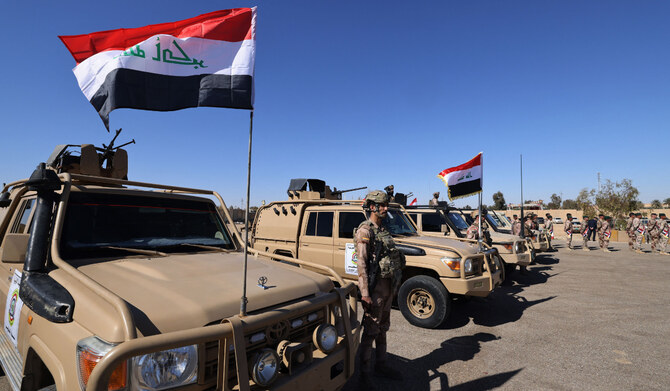BAGHDAD: The US military and Iraq launched a joint raid targeting suspected Daesh terrorists in the country’s western desert that killed at least 15 people and left seven American troops hurt, officials said on Saturday.
For years after dislodging the militants from their self-declared caliphate across Iraq and Syria, US forces have fought Daesh. However, the casualties from this raid were higher than in previous ones.
The US military’s Central Command said the militants were armed with “numerous weapons, grenades, and explosive ‘suicide’ belts” during the raid on Thursday, which Iraqi forces said happened in the country’s Anbar Desert.
“This operation targeted Daesh leaders to disrupt and degrade Daesh’s ability to plan, organize, and conduct attacks against Iraqi civilians, as well as US citizens, allies, and partners throughout the region and beyond,” Central Command said.
“Iraqi security forces continue to further exploit the locations raided.”
It added: “There is no indication of civilian casualties.”
An Iraqi military statement said “airstrikes targeted the hideouts, followed by an airborne operation.”
“Among the dead were key Daesh leaders,” Iraq’s military said, without identifying them.
“All hideouts, weapons, and logistical support were destroyed, explosive belts were safely detonated, and important documents, identification papers, and communication devices were seized.”
A US defense official said that five American troops were wounded in the raid, while two others suffered injuries from falls during the operation.
The official said that one who suffered a fall was transported out of the region, while one of the wounded was evacuated for further treatment.
“All personnel are in stable condition,” the official said.
It was not immediately clear why it took two days for the US to acknowledge it took part in the raid. Iraq did not say the US took part in the operation when initially announcing it, as politicians debate the future of having American troops in the country.
There are approximately 2,500 US troops in Iraq.
Since the US toppled Saddam Hussein with its 2003 invasion of Iraq, the country has struggled to balance relations between America and neighboring Iran.
Since the Israel-Hamas war broke out, Iraqi militias allied to Iran have targeted US forces there, leading to American airstrikes targeting them.
At its peak, Daesh ruled an area half the size of the UK. It attempted to enforce its extremist policies, which included attacks on religious minority groups.
A coalition of more than 80 countries led by the US was formed to fight the group, which lost its hold on the territory it controlled in Iraq in 2017 and in Syria in 2019.
However, the militants have continued to operate in the Anbar Desert in Iraq and Syria while claiming attacks carried out by others elsewhere in the world inspired by the group. That includes the two suspects in a foiled plot to attack Taylor Swift’s shows in Vienna.
Meanwhile, the Daesh branch in Afghanistan is known to carry out intensely bloody assaults.
Last month, the US military said the number of attacks claimed by Daesh in Syria and Iraq was on track to double this year compared with the year before.
Daesh claimed 153 attacks in the two countries in the first six months of 2024, compared with 121 attacks in 2023.
Iraqi officials say that they can keep the IS threat under control with their forces and have entered into talks with the US aimed at winding down the mission of the US-led military coalition in Iraq.
Since the outbreak of the Israel-Hamas war in Gaza last October, US military presence in the region has become particularly contentious.
An umbrella group of Iran-backed militias calling itself the Islamic Resistance in Iraq has periodically launched drone attacks on bases housing US troops in Iraq and Syria, which they said was in retaliation for Washington’s support of Israel in the ongoing war in Gaza and were aimed at forcing US forces to withdraw from Iraq.


























